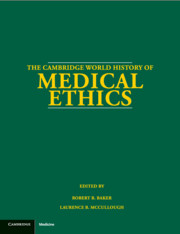Book contents
- Frontmatter
- PART I AN INTRODUCTION TO THE HISTORY OF MEDICAL ETHICS
- PART II A CHRONOLOGY OF MEDICAL ETHICS
- PART III DISCOURSES OF MEDICAL ETHICS THROUGH THE LIFE CYCLE
- 3 Medical Ethics through the Life Cycle in Hindu India
- 4 Medical Ethics through the Life Cycle in Buddhist India
- 5 Medical Ethics through the Life Cycle in China
- 6 Medical Ethics through the Life Cycle in Japan
- 7 Medical Ethics through the Life Cycle in Europe and the Americas
- 8 Medical Ethics through the Life Cycle in the Islamic Middle east
- PART IV THE DISCOURSES OF RELIGION ON MEDICAL ETHICS
- PART V THE DISCOURSES OF PHILOSOPHY ON MEDICAL ETHICS
- PART VI THE DISCOURSES OF PRACTITIONERS ON MEDICAL ETHICS
- PART VII THE DISCOURSES OF BIOETHICS
- PART VIII DISCOURSES ON MEDICAL ETHICS AND SOCIETY
- Appendix: Biographies: Who Was Who in the History of Medical Ethics
- Bibliography
- Index
5 - Medical Ethics through the Life Cycle in China
from PART III - DISCOURSES OF MEDICAL ETHICS THROUGH THE LIFE CYCLE
Published online by Cambridge University Press: 28 May 2012
- Frontmatter
- PART I AN INTRODUCTION TO THE HISTORY OF MEDICAL ETHICS
- PART II A CHRONOLOGY OF MEDICAL ETHICS
- PART III DISCOURSES OF MEDICAL ETHICS THROUGH THE LIFE CYCLE
- 3 Medical Ethics through the Life Cycle in Hindu India
- 4 Medical Ethics through the Life Cycle in Buddhist India
- 5 Medical Ethics through the Life Cycle in China
- 6 Medical Ethics through the Life Cycle in Japan
- 7 Medical Ethics through the Life Cycle in Europe and the Americas
- 8 Medical Ethics through the Life Cycle in the Islamic Middle east
- PART IV THE DISCOURSES OF RELIGION ON MEDICAL ETHICS
- PART V THE DISCOURSES OF PHILOSOPHY ON MEDICAL ETHICS
- PART VI THE DISCOURSES OF PRACTITIONERS ON MEDICAL ETHICS
- PART VII THE DISCOURSES OF BIOETHICS
- PART VIII DISCOURSES ON MEDICAL ETHICS AND SOCIETY
- Appendix: Biographies: Who Was Who in the History of Medical Ethics
- Bibliography
- Index
Summary
INTRODUCTION
In the West, human life is believed to be precious and sacred mainly because the first human was created in the image and likeness of God according to the Judeo-Christian tradition. In Chinese civilization, the preciousness and even sacredness of human life is often believed to originate in nature, from which human beings come and on which human existence depends. In both Confucianism and Daoism, every individual's life from the very beginning to the end is seen to be closely and mysteriously related to nature, physically and spiritually understood. This idea has been argued and promoted in numerous medical and nonmedical works. For example, as the twenty-fifth book “Treasuring Life and Preserving Health” in Suwen of Huangdi Neijing (The Yellow Emperor's Classic of Medicine) puts it, “Of all things in the universe, nothing is more precious than human beings” because what is called human life “is born from the earth, depends on the heaven, and begins with the intercourse of heavenly and earthly qi” (Nanjing Zhongyi Xueyuan 1981, 209). Li Pengfei, a physician in the Yuan Dynasty (1271–1368), stated that the human is the most precious entity between heaven and earth, although, due to the restriction of our physical existence, few know why this is so. We human beings are precious not only because we are an organic part of nature, but also because we are in correspondence with nature.
- Type
- Chapter
- Information
- The Cambridge World History of Medical Ethics , pp. 126 - 131Publisher: Cambridge University PressPrint publication year: 2008



